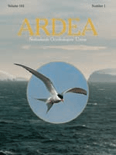
ARDEA
Scope & Guideline
Fostering collaboration in animal science and ecology.
Introduction
Aims and Scopes
- Avian Ecology and Behavior:
Research articles often delve into the ecological roles of birds, exploring their behavior, feeding strategies, and interactions with their environments. - Conservation Biology:
The journal prioritizes studies that inform conservation strategies, particularly for threatened or poorly understood species, emphasizing the need for targeted research efforts. - Migration and Movement Patterns:
A significant focus on the migratory behaviors of various bird species, examining the effects of environmental changes on migration and population dynamics. - Breeding Biology and Reproductive Strategies:
Numerous studies investigate the breeding patterns, nest success, and parental care strategies, contributing to our understanding of avian reproduction. - Impact of Environmental Changes:
Research often assesses how habitat alterations, climate change, and anthropogenic factors affect bird populations and communities. - Community and Population Dynamics:
Articles frequently explore the dynamics within bird communities, addressing issues of competition, habitat use, and the influence of species interactions.
Trending and Emerging
- Climate Change Effects on Avian Populations:
There is an increasing body of work examining how climate change is influencing breeding phenology, migration patterns, and habitat selection in various bird species. - Ecological Interactions and Community Dynamics:
Studies exploring the interactions among bird species, including competition and predation dynamics, are gaining traction, highlighting the complexities of avian communities. - Conservation Prioritization for Lesser-Known Species:
Recent papers emphasize the need to focus conservation efforts on poorly known species, like buttonquails, indicating a trend towards inclusivity in conservation research. - Innovative Methodologies in Bird Research:
The adoption of new technologies, such as drone imagery for bird counts and molecular methods for dietary studies, is emerging as a significant theme, enhancing research capabilities. - Human-Wildlife Interactions and Management:
Research addressing the conflicts and interactions between bird populations and human activities, particularly in agricultural and urban settings, is becoming increasingly relevant.
Declining or Waning
- Invasive Species Impact Studies:
Research focusing specifically on the impacts of invasive bird species has decreased, possibly as the field shifts towards broader ecological interactions or conservation-focused studies. - Traditional Taxonomy and Classification:
There seems to be a decline in papers solely dedicated to taxonomic classification, as the journal increasingly emphasizes ecological and behavioral studies. - Historical Data Studies:
While historical data analyses have been significant in understanding long-term trends, recent publications show a shift towards contemporary ecological studies and immediate conservation needs. - Captive Bird Studies:
Research centered on captive birds and their behavior has become less frequent, reflecting a broader shift towards field-based research that addresses wild populations and their habitats.
Similar Journals
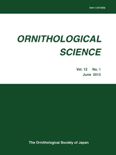
ORNITHOLOGICAL SCIENCE
Unveiling the secrets of avian biology and behavior.ORNITHOLOGICAL SCIENCE, published by the Ornithological Society of Japan in collaboration with the University of Tokyo, stands as a pivotal platform for advancing knowledge in the field of ornithology. With a keen focus on avian biology and conservation, this esteemed journal is dedicated to publishing high-quality research, reviews, and technical notes that explore the intricacies of bird science. Although currently categorized within the Q4 quartile in Animal Science and Zoology, the journal aims to elevate its standings by fostering scholarly communication and impactful scientific discourse. This journal has been consistently publishing since its inception in 2002, with a brief hiatus before resuming its invaluable contributions to the scientific community in 2009. Despite the absence of specific open access options, the journal remains a crucial resource for researchers, professionals, and students seeking to expand their understanding of avian ecology and behavior. Through its comprehensive scope, ORNITHOLOGICAL SCIENCE reflects the increasing importance of ornithological studies in addressing global biodiversity issues and conservation challenges.

ENVIRONMENTAL BIOLOGY OF FISHES
Illuminating the vital connections between fish and their habitats.ENVIRONMENTAL BIOLOGY OF FISHES, published by SPRINGER, is a premier journal in the fields of Aquatic Science and Ecology, Evolution, Behavior and Systematics. With a rich history spanning from 1976 to 2024, this esteemed journal provides a platform for groundbreaking research that addresses critical issues such as fish ecology, species behavior, and environmental influences on aquatic life. Recognized for its significant contributions, it holds a Q2 ranking in both the Aquatic Science and Ecology categories, reflecting its influence and relevancy in the academic community. The journal's focus on innovative ecological studies makes it an essential resource for researchers, professionals, and students dedicated to advancing our understanding of fish biology and the broader ecological systems of which they are a part. Although not an open-access publication, the insights and findings presented in its articles are invaluable for those engaged in the preservation and sustainable management of aquatic environments.
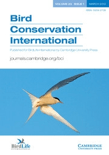
BIRD CONSERVATION INTERNATIONAL
Driving knowledge and policy for a sustainable avian future.BIRD CONSERVATION INTERNATIONAL, published by Cambridge University Press, stands as a premier academic journal dedicated to the field of avian conservation and the vital ecological interactions that sustain bird populations worldwide. With an impressive impact factor reflected through its Q1 ranking in Animal Science and Zoology, alongside notable Q2 standings in Ecology and Nature and Landscape Conservation, this journal provides a crucial platform for researchers and practitioners committed to advancing the science and practice of bird conservation. Spanning articles from its inception in 1991 through to its future publications in 2024, BIRD CONSERVATION INTERNATIONAL not only fosters innovative research but also nurtures a global community dedicated to the preservation of avian species and their habitats. While currently not offering open access, it remains a cornerstone for scholarly communication in its field, making significant contributions to knowledge and policy shaping conservation efforts across the globe.
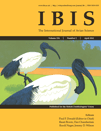
IBIS
Advancing ecological knowledge since 1859.IBIS, published by WILEY, stands as a prestigious journal in the field of animal science, zoology, and ecology since its inception in 1859. With a focus on innovative research that informs the scientific community on ecological dynamics, behavioral studies, and conservation strategies, IBIS fills a critical niche for researchers, professionals, and students alike. The journal is recognized for its robust impact factor and commands a Q1 ranking in three key categories as of 2023, demonstrating its influence and reach within the global academic landscape, particularly in Animal Science, Ecology, Evolution, Behavior and Systematics, and Nature and Landscape Conservation. Although not an open-access publication, its rigorous peer-review process ensures high-quality contributions that advance knowledge in these vital areas. Through interdisciplinary collaboration and comprehensive coverage of cutting-edge topics, IBIS remains an essential resource for those striving to understand and protect our natural world.
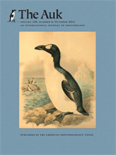
Ornithology
Elevating Understanding of Our Feathered Friends.Ornithology, published by Oxford University Press Inc, is a premier journal dedicated to the field of avian biology, offering a platform for researchers, professionals, and students to share groundbreaking findings in the study of birds. With an impressive impact factor and ranking in the Q1 quartile for both Animal Science and Zoology, as well as Ecology, Evolution, Behavior, and Systematics, Ornithology serves as a vital resource for advancing our understanding of avian species and their ecological roles. The journal allows open access viewing, broadening the reach and impact of published research. Covering comprehensive studies from 1982 to 2023, it facilitates collaboration and innovation within the global ornithological community. Engaging with Ornithology not only elevates your research profile but also contributes to the rich tapestry of knowledge concerning the world's diverse bird populations.
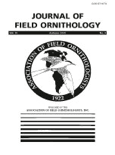
JOURNAL OF FIELD ORNITHOLOGY
Fostering Knowledge in the World of BirdsJOURNAL OF FIELD ORNITHOLOGY, published by the Resilience Alliance, is a premier academic journal dedicated to advancing knowledge in the fields of ornithology, ecology, and animal behavior. With an ISSN of 0273-8570 and a growing E-ISSN of 1557-9263, this journal has been a vital platform for researchers since its inception in 1996, continuing to publish cutting-edge studies up until 2024. The journal is recognized within the academic community, holding a Q2 ranking in Animal Science and Zoology and a Q3 ranking in Ecology, Evolution, Behavior and Systematics as of 2023. While the journal does not currently operate under an open access model, it remains a critical source for researchers, students, and professionals seeking to explore innovative research and discoveries in field ornithology. The diverse range of topics covered underscores its commitment to highlighting significant findings and fostering a deeper understanding of avian species and their ecosystems.
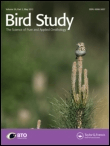
BIRD STUDY
Advancing avian knowledge for a sustainable future.BIRD STUDY, an esteemed journal published by Taylor & Francis Ltd, stands at the forefront of avian research, contributing significantly to the fields of ecology, evolution, behavior, and conservation. With its ISSN 0006-3657 and E-ISSN 1944-6705, this journal has been a cornerstone of ornithological studies since its inception in 1954 and continues to provide a critical platform for the dissemination of knowledge through 2024 and beyond. It holds a respectable Q3 quartile ranking in both Ecology, Evolution, Behavior and Systematics and Nature and Landscape Conservation, reflecting its pivotal role in the academic community. While the journal is not open access, it continues to attract submissions from a diverse array of researchers and professionals eager to share their findings on the intricate and dynamic interactions of birds within their ecosystems. As the global focus on biodiversity and conservation intensifies, BIRD STUDY remains dedicated to fostering knowledge and encouraging evidence-based practices that aim to protect avian species and their habitats.
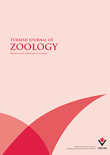
TURKISH JOURNAL OF ZOOLOGY
Pioneering Research in Zoology and BeyondThe TURKISH JOURNAL OF ZOOLOGY, published by the esteemed Tubitak Scientific & Technological Research Council Turkey, serves as a pivotal platform for the dissemination of research in the field of zoology and animal science. With an ISSN of 1300-0179 and an E-ISSN of 1303-6114, this journal has been contributing to the scientific community since its inception in 1994 and will continue to do so through 2024. Renowned for its scientific rigor, the journal holds a Q3 ranking in the 2023 category of Animal Science and Zoology, placing it within the prominent ranks of Scopus with a current percentile of 56, and an overall rank of 214 out of 490 in its domain. As an essential resource for researchers, professionals, and students, the journal prioritizes quality research, fostering knowledge exchange and collaboration among scholars worldwide. With its commitment to advancing understanding in zoological sciences, the TURKISH JOURNAL OF ZOOLOGY stands as a significant contribution to the global scientific dialogue.
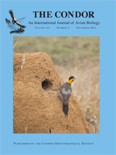
Ornithological Applications
Elevating ornithology through cutting-edge research and insights.Ornithological Applications, published by Oxford University Press, is a premier academic journal dedicated to advancing the field of ornithology through innovative research and practical applications. With an impressive impact factor and recognized as a Q1 journal in both Animal Science and Zoology as well as Ecology, Evolution, Behavior and Systematics, it ranks among the top journals in its field, holding significance for researchers, professionals, and students alike. With a historical publication span from 1981 to the present, this journal has solidified its reputation for disseminating high-quality articles that explore avian biology, conservation, and management strategies. For those interested in open access publishing options, please check the title change details. As a vital resource, Ornithological Applications serves as a cornerstone for professionals looking to enhance their understanding of avian science and its critical applications in today's rapidly changing ecosystems.

ORNIS FENNICA
Bridging Theory and Practice in Ornithological StudiesORNIS FENNICA, published by BirdLife Finland, is a seminal journal dedicated to the field of ornithology and avian ecology. Established in Finland, this journal has been a vital resource for researchers, professionals, and students since its inception, evolving through converged publication periods from 1979 to 1985 and again from 1991 to the present. ORNIS FENNICA holds a Q2 category ranking in Animal Science and Zoology for 2023, indicating its significant influence and reputation within the academic community, as reflected in its Scopus ranking of 242 out of 490 in its field. The journal aims to promote the study of birds, encompassing aspects such as behavior, conservation, and biodiversity, thus serving as a crucial platform for disseminating innovative research findings. Although it is not open access, ORNIS FENNICA remains committed to advancing ornithological knowledge and supporting the scientific community's efforts to understand and protect avian species. For those invested in the nuances of bird research, this journal offers an invaluable repository of scholarly articles, reviews, and insights.